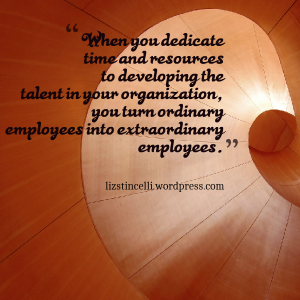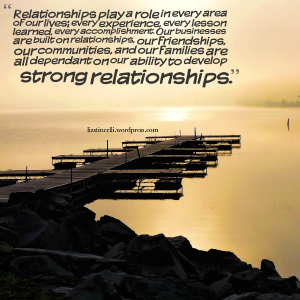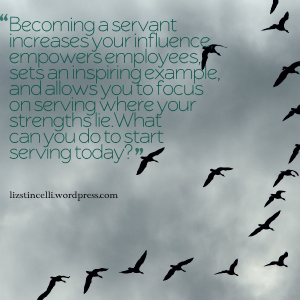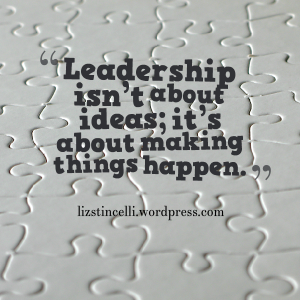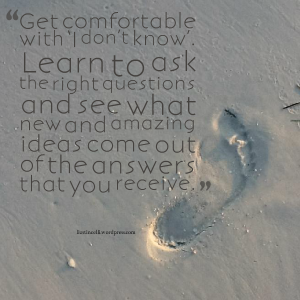Tag Archives: Leadership
Developing Talent in Your Organization: Getting More from Your Employees by Giving M.O.R.E.
 “We cannot create observers by saying ‘observe’, but by giving them the power and the means for this observation.” —Maria Montessori
“We cannot create observers by saying ‘observe’, but by giving them the power and the means for this observation.” —Maria Montessori
By Elizabeth Stincelli, DM
Get More
While Maria Montessori was speaking about the education of children, her idea applies just as well to employees and how we develop the talent in our organizations. We want to hire the best and the brightest, we get really excited when we find them, and then they leave. Why? The only way to keep employees with great potential is to give them M.O.R.E.
Have you ever had the experience of pulling into your driveway after leaving the office and realizing that you drove the whole way home on auto pilot? Sometimes I have even found myself driving, going into auto pilot mode, and heading to the office when where I intended to go was Costco. This phenomenon makes me laugh at myself, but it also gets me thinking about engaging our minds in what we are doing when tasks become routine. What might we miss along the way? Will we end up at our intended destination?
So, what happens when our employees’ tasks become routine? If they are not challenged or engaged and their mind goes on auto pilot, what might they miss? What opportunities for improvement are we sacrificing? How long will employees with great potential stay with our organization if they aren’t challenged and offered opportunity?
As a leader, you must learn to recognize the talent in your employees and give them the stage to shine. When you dedicate time and resources to developing the talent in your organization, you turn ordinary employees into extraordinary employees. If you want to get more from your employees, you are going to have to give M.O.R.E.
Motivate
Lee Iacocca emphasized that we should, “Start with good people, lay out the rules, communicate with your employees, motivate them and reward them. If you do these things effectively, you can’t miss.” Your employees possess knowledge, skills, and experience that they want to share with your organization. When you encourage them to make the most of their talents and you invest in them, your employees will become motivated. You must recognize that each employee is unique; they possess different talents and are motivated in different ways. Show that you value their capabilities, help them further develop their talents, and motivate them based on their individual personalities.
Opportunity
Steven Spielberg believes, “The delicate balance of mentoring someone is not creating them in your own image, but giving them the opportunity to create themselves.” You must learn to see the extraordinary potential in each employee and give them the opportunity to reach it. Give them the necessary skills and resources they need and then let them tackle challenges on their own and in their own way. Provide a safe place for them to try, fail, and learn from their mistakes. Give employees the opportunity to become the best versions of themselves; let them learn from one another, design how their own work gets done, and make decisions on their own. Create opportunities for your employees and then help them see that opportunity is available all around them.
Relationships
Joyce Meyer tells us, “We can improve our relationships with others by leaps and bounds if we become encouragers instead of critics.” Build relationships with your employees based on mutual trust and respect. Invest your time and resources into bringing out the best in others; become their coach and loudest cheerleader. Build a strong sense of community where employees feel a sense of belonging and a vested interest in the success of the organization. Communicate openly and share information often so employees know where they stand as individuals, where the team stands, and where the organization stands. When employees know that you care and are looking out for their best interest, you will build strong relationships that foster trust and loyalty.
Empower
Tom Ridge explained, “You have to enable and empower people to make decisions independent of you. As I’ve learned, each person on a team is an extension of your leadership; if they feel empowered by you they will magnify your power to lead.” Engage employees in contributing to problem identification and solving conversations. Encourage them to make decisions and to share their knowledge and experience with others. Give them the tools they need and then empower them to make decisions and take control of their own work.
Give M.O.R.E.
Everyone benefits when employees develop their talents; productivity increases, quality improves, and morale strengthens. When you invest in your employees and provide them with opportunity you will be amazed how your culture, morale, and outcomes improve.
Your investment in the development of your employees is proof that you value them as individuals, that you recognize the contribution they make to the organization, and that you are excited about their potential. As your employees grow, so will the capabilities and success of the organization, and so will you as a leader.
Help employees reach their full potential; retain valuable talent, and improve the adaptability of the organization by giving your employees M.O.R.E.
© 2015 Elizabeth Stincelli
Elizabeth Stincelli is passionate about recognizing and inspiring the leader in each of us. She is the CEO of Stincelli Advisors where she focuses on helping organizations engage employees and improve organizational culture. Elizabeth holds a Doctor of Management degree with an emphasis on organizational leadership.
Learn more about Elizabeth by visiting her website, stincelliadvisors.com and connect with her on Twitter @infinitestin, Google+, and LinkedIn. You can contact her by email at stincelliadvisors@gmail.com.
Relationships: Strategy or Trust?
“Friend, there’s no greater investment in life than in being a people builder. Relationships are more important than our accomplishments.”—Joel Osteen
By Elizabeth Stincelli, DM
Why Relationships Matter
Relationships play a role in every area of our lives; every experience, every lesson learned, every accomplishment. Our businesses are built on relationships, our friendships, our communities, and our families are all dependant on our ability to develop strong relationships. Relationships serve as a barometer, telling us if someone is a friend or a foe.
When it comes to your relationships, are they based solely on strategic positioning, or are they built on trust? Are they authentic? Are they rooted in looking out for each other’s best interests, or are you each in it only for yourselves?
Built on strategy?
Ross Perot believes, “Business is not just doing deals; business is having great products, doing great engineering, and providing tremendous service to customers. Finally, business is a cobweb of human relationships.” Are your relationships focused only on the deal? Relationships based solely on strategy are usually one-sided; they are manipulative and unsupportive. Are you focused on what’s in it for you? If you find yourself only doing for others because you expect something in return, you are in a strategic relationship.
Built on trust?
Albert Einstein told us, “Whoever is careless with the truth in small matters cannot be trusted with important matters.” Trusting connection is what brings relationships to life. Are you treating others the way you would like to be treated? Relationships built on trust are open and welcoming. In these types of relationships you are seeking to create win-win situations. Your communications are transparent and honest, and your intentions are clear. If you are each looking out for the best interest of the other, you are in a trusting relationship.
Build Strong Relationships
Strategic relationships are like a game of chess, except no one wins in this game. Mona Sutphen said, “Most good relationships are built on mutual trust and respect.” When you build strong relationships you create shared successes. You feel comfortable in these relationships knowing that your communications are honest, that they are not self-serving, and they are mutually supportive. Relationships are the vehicle with which you gain influence, create situations in which everyone wins, and achieve your goals. Building strong relationships which are based on trust, not strategy, is the key to success in your business, in your community, and in your home.
© 2015 Elizabeth Stincelli
Elizabeth Stincelli is passionate about recognizing and inspiring the leader in each of us. She is the CEO of Stincelli Advisors where she focuses on helping organizations engage employees and improve organizational culture. Elizabeth holds a Doctor of Management degree with an emphasis on organizational leadership.
Learn more about Elizabeth by visiting her website, stincelliadvisors.com and connect with her on Twitter @infinitestin, Google+, and LinkedIn. You can contact her by email at stincelliadvisors@gmail.com.
Become a Servant Leader
Four Reasons You Need to Become a Servant Leader
“The first responsibility of a leader is to define reality. The last is to say thank you. In between, the leader is a servant.” —Max de Pree
By Elizabeth Stincelli, DM
Servant Leadership
Leadership is a privilege and may say more about your character than any other action you might take. What makes servant leadership different than any other form of leadership? Servant leaders focus on meeting the needs of others rather than gaining fame, fortune, and power for themselves. They recognize that every employee has value. They care about everyone who interacts with the organization. They listen to and respect those they work with. To be a servant leader, a heart and mind for service has to be ingrained in your core values. Here are four reasons you need to be a servant leader.
Influence
Henry Drummond believed, “The people who influence you are the people who believe in you.” Leadership is based on an ability to influence. Servant leaders influence others based on the building of trusting and respectful relationships. They show employees that they believe in them. Their leadership builds consensus and collaboration. Servant leaders understand that everyone needs to be encouraged and truly cared for on an individual level. They know that people can accomplish amazing things when they are inspired by a purpose beyond themselves. Servant leaders do right by their people, and their people do right by the organization. These leaders put themselves where they can influence by doing the most good for those they lead and by giving others something to believe in.
Empowerment
Bill Gates tells us, “As we look ahead into the next century, leaders will be those who empower others.” Servant leaders provide the support system and resources that employees need to do their jobs and then give them control over their own work. They are the opposite of command and control leaders; they lead by empowering, encouraging, and serving. Their aim is to equip and bring out the best in others. Servant leaders help others become engaged so that they can make their own positive impact. When employees feel empowered, they take ownership of their work; this ownership, improves morale, productivity, and quality.
Example
Jeffrey Gitomer explained, “Management’s job is to convey leadership’s message in a compelling and inspiring way. Not just in meetings, but also by example.” You are setting the leadership example. Servant leaders share their knowledge, help others in any way they can, and give of their time and resources to everyone. Their humble, selfless example of leadership builds teams of individuals who also want to be of service to others. This service brings people together and creates a unity that is inspiring, productive, and engaging.
Strengths and weaknesses
Zig Ziglar advised us, “Try to look at your weakness and convert it into your strength. That’s success.” You have strengths, but you also have weaknesses. Servant leaders recognize where they are best able to help others, and where others are best able to help them. They use their strengths to meet the needs of others. And, they provide the tools and learning opportunities needed for employees to grow their own strengths and abilities. Servant leaders serve and support behind the scenes, allowing employees a sense of accomplishment and control.
Become a Servant
Making it your primary role to serve others is both satisfying and productive. Becoming a servant leader shows strength of character. It builds strong relationships and develops servant leaders throughout your organization. Becoming a servant increases your influence, empowers employees, sets an inspiring example, and allows you to focus on serving where your strengths lie.
What can you do to start serving today?
© 2015 Elizabeth Stincelli
Elizabeth Stincelli is passionate about recognizing and inspiring the leader in each of us. She is the CEO of Stincelli Advisors where she focuses on helping organizations engage employees and improve organizational culture. Elizabeth holds a Doctor of Management degree with an emphasis on organizational leadership.
Learn more about Elizabeth by visiting her website, stincelliadvisors.com and connect with her on Twitter @infinitestin, Google+, and LinkedIn. You can contact her by email at stincelliadvisors@gmail.com.
Inspiration, Influence, Innovation, and Impact
The Four I’s of Leadership: Inspiration, Influence, Innovation, and Impact
“Leadership is not about a title or a designation. It’s about impact, influence, and inspiration. Impact involves getting results, influence is about spreading the passion you have for your work, and you have to inspire team mates and customers.” — Robin S. Sharma
By Elizabeth Stincelli, DM
Leadership
While we may be able to make a list a mile long of factors that play a role in effective leadership, you will be well on your way if you can nail down the four I’s of leadership; inspiration, influence, innovation, and impact. These are key factors that will determine your ability to be effective in any other aspect of leadership. Leadership isn’t about ideas; it’s about making things happen. Focus your attention and energy on the four I’s of leadership and watch what happens.
Inspiration
John Quincy Adams said, “If your actions inspire others to dream more, learn more, do more, and become more, you are a leader.” A leader inspires and motivates colleagues. They can spark the passion and creativity that encourages others to accomplish amazing things. Inspiration is the beginning of everything else; seek it at every turn and in every corner. Use your inspiration to pursue something you believe in; use it to make things happen and to inspire greatness in others. Let your inspiration be the spark that lights a wild fire.
Influence
John Hancock explained, “The greatest ability in business is to get along with others and to influence their actions.” Influence is how you get things done as a leader. In order to influence others you must build trusting relationships and show genuine concern on an individual level. Be a role model of accountability, perseverance, and courage. Be respectful in all of your interactions. Earnestly motivate your employees to accomplish noteworthy tasks and provide recognition rather than seek it. Become a good listener, then follow through and follow up. Share your wisdom and be transparent in your words and actions. When you become someone who employees look up to, you will have the influence you need to lead.
Innovation
William Pollard believed, “Learning and innovation go hand in hand. The arrogance of success it to think that what you did yesterday will be sufficient for tomorrow.” Where will your success come from tomorrow? As a leader, you must focus your resources on challenging the status quo and helping others innovate. Reach across your organization for new and innovative ideas; fresh perspectives inspire fresh thinking. Leverage the disruptive opinions and opposing points of view you find in your organization to generate great ideas and question deeply held beliefs and assumptions. Provide a safe environment where employees can experiment and fail, then learn from that failure. Remember, innovation is never an end; it’s only a step in a continual process.
Impact
Sean Parker tells us, “I definitely wanted to earn my freedom. But the primary motivation wasn’t making money, but making an impact.” Ultimately, leadership is about getting results. Your leadership is not about you, it’s about creating a culture of accomplishment. It’s about making an impact by interweaving connections, challenges, and creative situations. Recognize that your leadership will have an impact, whether good or bad, on everyone who interacts with your organization. Leadership is about people; awaken in others the belief that they can accomplish extraordinary things and make them feel valued. And then, cultivate leadership in others; leave a legacy of impacting future leaders in such a positive way that they, in turn, will have the same impact on others.
Your Turn
According to Lao Tzu, “A leader is best when people barely know he exists, when his work is done, his aim fulfilled, they will say: we did it ourselves.” As a leader, your value will be determined, in part, by the four I’s of leadership. Are you an inspiration? Are you able to really influence others? Do you encourage innovation by dedicating time, support, and resources? And, are you making a positive impact? Four simple I’s that, if used correctly, will lift your employees and your leadership.
© 2015 Elizabeth Stincelli
Elizabeth Stincelli is passionate about recognizing and inspiring the leader in each of us. She is the CEO of Stincelli Advisors where she focuses on helping organizations engage employees and improve organizational culture. Elizabeth holds a Doctor of Management degree with an emphasis on organizational leadership.
Learn more about Elizabeth by visiting her website, stincelliadvisors.com and connect with her on Twitter @infinitestin, Google+, and LinkedIn. You can contact her by email at stincelliadvisors@gmail.com.
Get Comfortable With ‘I Don’t Know’
Leaders Don’t Need to Know all the Answers
“The wise man doesn’t give the right answers, he poses the right questions.” —Claude Levi-Strauss
By Elizabeth Stincelli, DM
You Don’t Need to Know the Answers
Ruth Benedict explained, “The trouble with life isn’t that there is no answer, it’s that there are so many answers.” No one person can know everything or have all the answers. When you get into the mindset that, as a leader, you must know all of the answers, you have immediately set yourself up for failure.
‘I don’t know’ is one of the hardest things to say. Somehow, these three little words make us feel inept. When, in all actuality, these three words might be the smartest thing you have ever said. Gore Verbinski advised us, “I think you can never ever lie, ever. If you don’t know, say ‘I don’t know’.” You don’t need to know all the answers; you just need to know how to ask the right questions.
So, get comfortable with ‘I don’t know’. Learn to ask the right questions and see what new and amazing ideas come out of the answers that you receive.
You Need to Ask the Right Questions
Indira Gandhi said, “The power to question is the basis of all human progress.” Asking questions with an open-mind allows you to step outside your point-of-view and see problems and situations in completely new ways. You must develop a growth mindset; asking questions with the curiosity of a child for which you do not already have an answer in mind.
Asking great questions can lead to innovative, new ideas. Intriguing questions can even open rabbit holes to greater questions. When we bring a diverse group of people together to contemplate stimulating questions, we may get fascinating answers. According to Eugene Ionesco, “It is not the answer that enlightens, but the question.”
Learn to let go of thinking that you need to have all the answers, learn to ask the right questions, and open a world of amazing possibilities.
© 2015 Elizabeth Stincelli
Elizabeth Stincelli is passionate about recognizing and inspiring the leader in each of us. She is the CEO of Stincelli Advisors where she focuses on helping organizations engage employees and improve organizational culture. Elizabeth holds a Doctor of Management degree with an emphasis on organizational leadership.
Learn more about Elizabeth by visiting her website, stincelliadvisors.com and connect with her on Twitter @infinitestin, Google+, and LinkedIn. You can contact her by email at stincelliadvisors@gmail.com.

